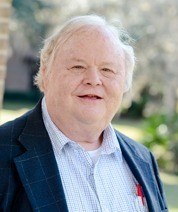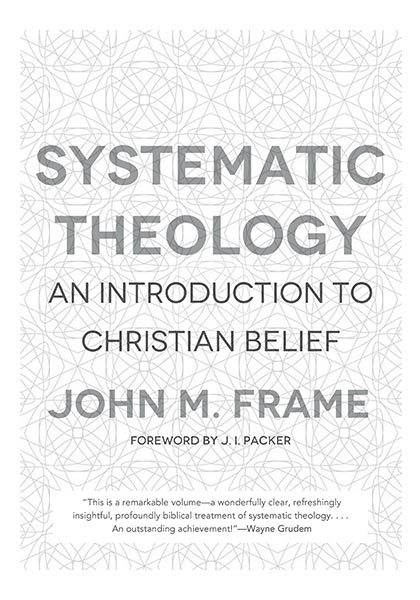John Frame’s new Systematic Theology (P&R, 2013) is a landmark event in his long publishing career, and for our first Author Interview here at Books At a Glance we were pleased to talk with him about his new work.
Books At a Glance:
We would like to begin on a personal note. Please tell us something about your background. When did you first come to Christ? Do your present theological commitments reflect your up-bringing as a child? Your own theological background?
Frame:
I was raised in the Pittsburgh area, first trusted Christ through the ministry of a Presbyterian church there. The youth ministry gave me the Gospel, and the choir program got it into my heart. My theological commitments have turned out to be largely the same as those of that church, though I have also had a lot of other influences.
Books At a Glance:
Could you give us a brief overview of your teaching career?
Frame:
I began teaching at Westminster/Philadelphia in 1968, working in both systematic theology and apologetics. In 1980 I became one of the founders of the Westminster campus in Escondido, California. In 2000 I moved to Orlando, Florida, to teach at the campus of Reformed Theological Seminary there.
Books At a Glance:
The value of your work in apologetics and systematic theology has long been recognized. Can you identify a specific area of study (or more?) that you have found to be your favorite? And how did your interest in this/these come about?
Frame:
My specific areas of study have usually been governed by curricular needs. Occasionally I have taken on subjects from a desire to address controversies: hence my two books on worship in the mid-1990s, my book on Open Theism in 2001, and my Academic Captivity of Theology from 2012.
Books At a Glance:
Please provide a definition of “systematic theology” for our readers. How is systematic theology different from other theological interests and approaches?
Frame:
Definitions are not anything we should live or die for, but we should choose definitions that facilitate our teaching. I define theology as “the application of God’s word by persons to all areas of human life.” Systematic theology differs from exegetical theology (the application of specific passages), biblical theology (the application of the history of redemption described in Scripture). Systematics applies Scripture to “whole Bible” questions: e.g., what does the whole Bible teach about God’s love, or sanctification, or the Christian’s use of the internet.
 Books At a Glance:
Books At a Glance:
You have often emphasized that theology is for the edification of God’s people. Can you give some advice concerning the role of theology and of continued theological study in the life and work of the pastor? The average church member?
Frame:
Too much theology is written by scholars for other scholars. Given the above definition, we should rather think of theology in broad terms, including sermons, evangelistic witness, and Sunday school lessons. There should be theology texts at all educational levels, for all these situations. We should do everything we can to help others grow in their knowledge of God’s Word (Matt. 4:4).
Books At a Glance:
You are well-known for your “threes” — your three-fold perspective on so many points of theology. Could you briefly explain this approach and why you find it helpful?
Frame:
That approach developed out of Cornelius Van Til’s definition of ethical goodness in terms of goal, motive, and standard. He got it, in turn, from the Westminster Confession of Faith, 16.7. I started to see the pattern in many Bible passages and doctrines. I think it comes ultimately from the nature of the Trinity: the Father has an eternal plan; the Son executes it; and the Spirit applies it to God’s people. I think the approach is helpful because it ties together so many theological concepts. Students have frequently affirmed its usefulness.
Books At a Glance:
Your book is a massive project. How long were you working toward its completion? What contributions did you hope to make in it? Are there factors that you hope distinguish your book in some way?
Frame:
I suppose I’ve been working on it as long as I have been a Christian. But more immediately, the book represents a condensation of the Theology of Lordship series that I began in 1984 or so. Even more immediately, I began to put the material into this form around 2009.
I’m hoping that the book will serve as a helpful summary of Christian doctrine. Distinctive features: (1) the threes (question #6), (2) a resolute attempt to understand and employ the methods of knowing God taught in Scripture itself, (3) focus on what the Bible says, with a corresponding lessening of focus on historical matters and contemporary theologians, (4) study questions, key terms, memory verses, bibliographies—helps so that people can teach themselves theology over a long period, (5) theology based in the Reformed tradition, but not sectarian.
Books At a Glance:
We were curious to see that you remained rather non-committal in your discussion of the various millennial positions. May we probe you in this regard a bit? Does this reflect an unsettledness on your own part? Do you favor any particular millennial position? Or do you prefer to take the position of A.T. Robertson, who claimed to be a “pro-millennialist: Whatever it is, I’m for it!”
Frame:
I’m probably more postmil than anything else, but I don’t think the Bible is perfectly clear in giving an order of events in the last days. That leaves me somewhat unsettled. But I think the best course for a theologian is to be honest in admitting that he doesn’t know something. Robertson and I would have gotten along just fine.
Books At a Glance:
Thank you for your years of theological work that have been a help to so many. And thank you for giving time to our readers!
Frame:
And thank you for giving me this opportunity!
Blessings in the Lord,
John Frame

